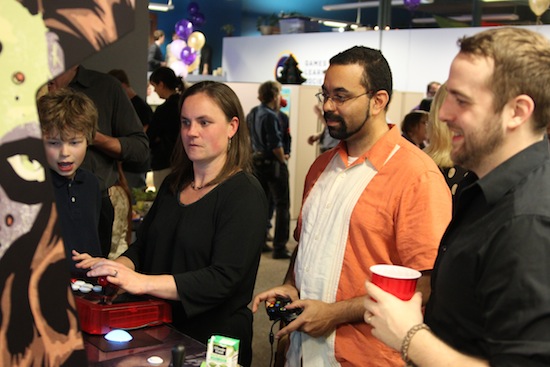Games+Learning+Society joins the Wisconsin Institute for Discovery

In a loftlike upper level of the purple building on the corner of University Avenue and Randall Street, people dart in and out of cubicles with NERF guns, forgetting deadlines and deliverables to wage playful battles for an hour or two with their colleagues and celebrate new office space.
“We’ve tried to cultivate a place with open doors where the line between productivity and play can blur,” says Kurt Squire, a UW–Madison professor of education and co-director of a new group called Games + Learning + Society (GLS) that recently joined the UW–Madison Wisconsin Institute for Discovery (WID). “We resemble something more akin to a bazaar than a cathedral — a grassroots mixture of interesting projects and people rather than a top-down orchestration.”
GLS developers and researchers conduct cutting-edge work that explores how video games can be used to improve learning and public participation in science.
“Video games are, for some, an unlikely way to reinvigorate public engagement in both science and civic life,” says Constance Steinkuehler, GLS co-director and an associate professor of education. “It’s not surprising for those who actually play them, of course.”
The group recently moved from its beginnings as part of the Morgridge Institute for Research to WID and the Learning Games Network (LGN), a private nonprofit that develops and distributes games inspired from the educational sciences.
A spin-off of UW–Madison and MIT based in Cambridge, Mass., LGN opened a studio in Madison to house its new staff and support the partnership. Located just across the street from the Discovery building, the group’s new space keeps its researchers, game developers, graphic designers and students closely connected to WID, private industry and non-profits, say Squire and Steinkuehler.
Originally founded almost a decade ago, GLS studies learning through educational games as we as games designed solely for commercial entertainment. Increasingly, that line between education and entertainment is blurring.
The team has developed several award-winning titles of its own, launched two educational game companies, and in collaboration with UW’s DoIT office, produced the Augmented Reality and Interactive Storytelling (ARIS) engine, a resource used by thousands of educators around the world.
While part of the Morgridge Institute, the private side of the Discovery partnership, the team focused on the nonprofit’s biomedical mission. After developing games such as “Virulent,” “Anatomy Browser” and “Progenitor X,” the team wanted to explore new areas beyond science as well.
Steinkuehler, who was on leave last year to serve as senior policy analyst in the White House Office of Science and Technology Policy, says what sets the lab apart from other universities’ games for impact programs is the complete integration of design and research, from “soup to nuts.”
“On the one hand, the challenge of games for impact is the fact that you have to have a game that meets the high production standards of industry; on the other hand, the game has to meet rigorous empirical standards for research,” says Steinkuehler. “It’s a tough double benchmark to meet. But because of our new home at WID, we have the capacity to marry artistic design with hard-core data analysis in a way that puts the odds in our favor for creating award-winning games that have a real market.”
WID Director David Krakauer worked closely with the researchers and the UW School of Education to coordinate GLS’s transition to the institute.
“I consider the intersection of gaming technologies, data analysis, data visualization and education an area of extraordinary intellectual and research interest, “Krakauer says. “Working together with Kurt, Constance and their team, we envision GLS at WID becoming an international leader in gaming-enabled thinking and culture creation.”
Other UW–Madison faculty include core GLS members Rich Halverson, an education professor who is a co-founder of GLS, and Erica Halverson, who’s also a professor of education. The group also gathers together affiliate professors, including Jonathan Gray and Derek Johnson in communication arts, Rebekah Willett in library and information studies, Shawn Green in psychology, and Jon McKenzie from the Digital Humanities Initiative.
– By Marianne English



